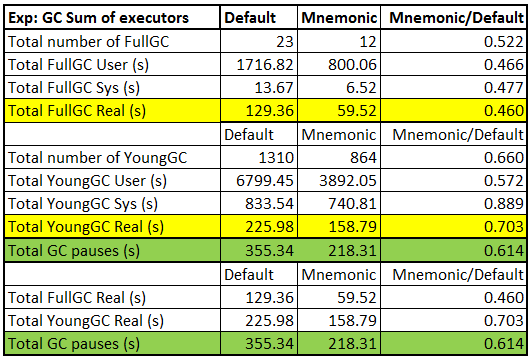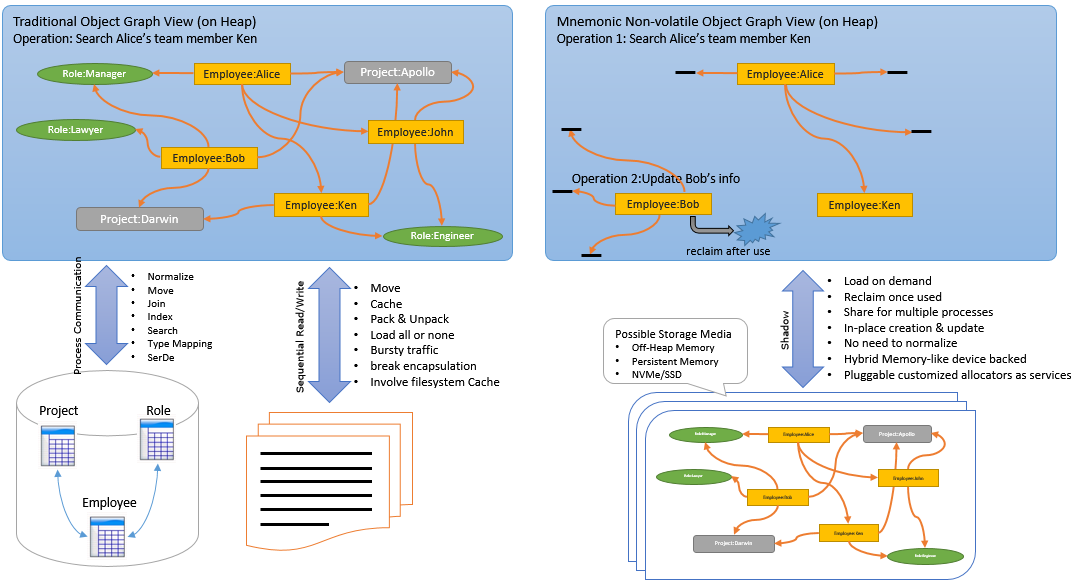================================
Apache Mnemonic is an advanced hybrid memory storage oriented library, it proposed a non-volatile/durable Java object model and durable computing service that bring several advantages to significantly improve the performance of massive real-time data processing/analytics. developers are able to use this library to design their cache-less and SerDe-less high performance applications.
- In-place data storage on local non-volatile memory
- Durable Object Model (DOM)
- Durable Native Computing Model (DNCM)
- Object graphs lazy loading & sharing
- Auto-reclaim memory resources and Mnemonic objects
- Hierarchical cache pool for massive data caching
- Extensible memory services for new device adoption and allocation optimization
- Durable data structure collection(WIP)
- Durable computing service
- Minimize memory footprint of on-heap
- Reduce GC Overheads as the following chart shown (collected from Apache Spark experiments)
- Drop-in Hadoop MapReduce support
/**
* a durable class should be abstract, implement Durable interface and marked with @DurableEntity annotation
*/
@DurableEntity
public abstract class Person<E> implements Durable, Comparable<Person<E>> {
E element; // Generic Type
/**
* callback for this durable object creation
*/
@Override
public void initializeAfterCreate() {
System.out.println("Initializing After Created");
}
/**
* callback for this durable object recovery
*/
@Override
public void initializeAfterRestore() {
System.out.println("Initializing After Restored");
}
/**
* setup generic info manually to avoid performance penalty
*/
@Override
public void setupGenericInfo(EntityFactoryProxy[] efproxies, GenericField.GType[] gftypes) {
}
@Test
public void testOutput() throws RetrieveDurableEntityError {
System.out.printf("Person %s, Age: %d ( %s ) \n", getName(), getAge(),
null == getMother()? "No Recorded Mother" : "Has Recorded Mother");
}
public int compareTo(Person<E> anotherPerson) {
int ret = 0;
if (0 == ret) ret = getAge().compareTo(anotherPerson.getAge());
if (0 == ret) ret = getName().compareTo(anotherPerson.getName());
return ret;
}
/**
* Getters and Setters for non-volatile fields marked with @DurableGetter and @DurableSetter
*/
@DurableGetter(Id = 1L)
abstract public Short getAge();
@DurableSetter
abstract public void setAge(Short age);
@DurableGetter(Id = 2L)
abstract public String getName() throws RetrieveDurableEntityError;
@DurableSetter
abstract public void setName(String name, boolean destroy) throws OutOfPersistentMemory, RetrieveDurableEntityError;
@DurableGetter(Id = 3L)
abstract public Person<E> getMother() throws RetrieveDurableEntityError;
@DurableSetter
abstract public void setMother(Person<E> mother, boolean destroy) throws RetrieveDurableEntityError;
@DurableGetter(Id = 4L)
abstract public Person<E> getFather() throws RetrieveDurableEntityError;
@DurableSetter
abstract public void setFather(Person<E> mother, boolean destroy) throws RetrieveDurableEntityError;
} // create an allocator instance
NonVolatileMemAllocator act = new NonVolatileMemAllocator(1024 * 1024 * 8, "./pobj_person.dat", true);
// fetch handler store capacity from this non-volatile storage managed by this allocator
KEYCAPACITY = act.handlerCapacity();
....
// close it after use
act.close(); // create a new non-volatile person object from this specific allocator
person = PersonFactory.create(act);
// set attributes
person.setAge((short)rand.nextInt(50));
person.setName(String.format("Name: [%s]", UUID.randomUUID().toString()), true);
// keep this person on non-volatile handler store
act.setHandler(keyidx, person.getHandler());
for (int deep = 0; deep < rand.nextInt(100); ++deep) {
// create another person as mother
mother = PersonFactory.create(act);
mother.setAge((short)(50 + rand.nextInt(50)));
mother.setName(String.format("Name: [%s]", UUID.randomUUID().toString()), true);
// set the person's mother
person.setMother(mother, true);
person = mother;
} for (long i = 0; i < KEYCAPACITY; ++i) {
System.out.printf("----------Key %d--------------\n", i);
// iterate non-volatile handlers from handler store of this specific allocator
val = act.getHandler(i);
if (0L == val) {
break;
}
// restore person objects from this specific allocator
Person<Integer> person = PersonFactory.restore(act, val, true);
while (null != person) {
person.testOutput();
// iterate all mother's ancestors
person = person.getMother();
}
} // fetch print service
GeneralComputingService gcsvr = Utils.getGeneralComputingService("print");
// instantiate a value info for a value matrix
ValueInfo vinfo = new ValueInfo();
// instantiate a object stack
List<long[][]> objstack = new ArrayList<long[][]>();
// fill up with all durable object info in order
objstack.add(firstnv.getNativeFieldInfo());
objstack.add(person.getNativeFieldInfo());
// configure the Id stack for each level of durable objects
long[][] fidinfostack = {{2L, 1L}, {0L, 1L}};
// configure the handler of a value matrix
vinfo.handler = handler;
// set translate table from handler's allocator
vinfo.transtable = m_act.getTranslateTable();
// specify the durable type of value
vinfo.dtype = DurableType.SHORT;
// generate frames for this value matri from both stacks
vinfo.frames = Utils.genNativeParamForm(objstack, fidinfostack);
// form an array of value infos
ValueInfo[] vinfos = {vinfo};
// perform the print operation
gcsvr.perform(vinfos);Please see the file LICENSE for information on how this library is licensed.
- mnemonic-core -- the submodule project for core
- mnemonic-collections -- the submodule project for generic collections
- mnemonic-examples -- the submodule project for examples, Please refer to the testcases of respective module as complete examples.
- mnemonic-memory-services/mnemonic-pmalloc-service -- the submodule project for pmalloc memory service
- mnemonic-memory-services/mnemonic-nvml-vmem-service -- the submodule project for vmem memory service
- mnemonic-memory-services/mnemonic-nvml-pmem-service -- the submodule project for pmem memory service
- mnemonic-memory-services/mnemonic-sys-vmem-service -- the submodule project for system vmem memory service
- mnemonic-memory-services/service-dist -- the location of extensive memory services (auto-generated)
- mnemonic-computing-services/mnemonic-utilities-service -- the submodule project for utilities computing service
- mnemonic-computing-services/service-dist -- the location of extensive computing services (auto-generated)
- mnemonic-hadoop/mnemonic-hadoop-mapreduce -- the submodule project for Apache Hadoop mapreduce computing
- mnemonic-spark/mnemonic-spark-core -- the submodule project for Apache Spark durable computing
| Features | NVML-VMEM | PMALLOC | NVML-PMEM | SYS-VMEM |
|---|---|---|---|---|
| Fixed Durable K-V Store | NA | O | O | NA |
| Support DOM | O | O | O | O |
| Support DNCM | O | O | O | O |
| Support OS X | NA | O | NA | O |
| Memory Map Sync. | NA | O | O | NA |
| PM Flush | NA | NA | O | NA |
| PM Drain | NA | NA | O | NA |
| PM Persist | NA | NA | O | NA |
| PM Atomic Ops. | NA | NA | O | NA |
| Expected Performance | Average | Average | Slow(on Disk) | Fast |
To build this library, you may need to install some required packages on the build system:
- Maven -- the building tool v3.2.1 or above [Required]
- NVML -- the NVM library (Please compile this library that was revised with 630862e82f) (http://pmem.io) [Optional if mnemonic-nvml-vmem-service/mnemonic-nvml-pmem-service are excluded, e.g. on MacOSX]
- JDK -- the Java Develop Kit 1.6 or above (please properly configure JAVA_HOME) [Required]
- PMFS -- the PMFS should be properly installed and configured on Linux system if you want to simulate read latency [Optional]
- PMalloc -- a supported durable memory native library(Latest) at https://github.com/NonVolatileComputing/pmalloc.git [Optional if mnemonic-pmalloc-service is excluded]
Once the build system is setup, this Library is built using this command at the top level:
$ git clean -xdf # if pull from a git repo.
$ mvn clean package installTo exclude a customized memory service for your platform e.g. OSX, note that if you excluded one or both memory services, some or all testcases/examples will fail since their dependent memory services are unavailable.
$ git clean -xdf # if pull from a git repo.
$ mvn -pl '!mnemonic-memory-services/mnemonic-nvml-vmem-service' clean package installTo install this package to local repository (required to run examples and testcases):
$ mvn clean installTo run an example:
$ # requires 'vmem' memory service to run, please refer to the code of test cases for more examples.
$ mvn exec:exec -Pexample -pl mnemonic-examplesTo run several test cases:
$ # a testcase for module "mnemonic-core" that requires 'pmalloc' memory service to pass
$ mvn -Dtest=DurablePersonNGTest test -pl mnemonic-core -DskipTests=false
$ # a testcase for module "mnemonic-core" that requires 'pmalloc' memory service to pass
$ mvn -Dtest=NonVolatileMemAllocatorNGTest test -pl mnemonic-core -DskipTests=false
$ # a testcase for module "mnemonic-core" that requires 'vmem' memory service to pass
$ mvn -Dtest=VolatileMemAllocatorNGTest test -pl mnemonic-core -DskipTests=false
$ # a testcase for module "mnemonic-core" that requires 'vmem memory service to pass
$ mvn -Dtest=MemClusteringNGTest test -pl mnemonic-core -DskipTests=false
$ # a testcase for module "mnemonic-collection" that requires 'pmalloc' memory service to pass
$ mvn -Dtest=DurableSinglyLinkedListNGTest test -pl mnemonic-collections -DskipTests=false
$ # a testcase for module "mnemonic-collection" that requires 'pmalloc' memory service to pass
$ mvn -Dtest=DurablePersonNGTest test -pl mnemonic-collections -DskipTests=false
$ # a testcase for module "mnemonic-computing-services/mnemonic-utilities-service" that requires 'pmalloc' memory service to pass
$ mvn -Dtest=DurableSinglyLinkedListNGPrintTest test -pl mnemonic-computing-services/mnemonic-utilities-service -DskipTests=false
$ # a testcase for module "mnemonic-computing-services/mnemonic-utilities-service" that requires 'pmalloc' memory service to pass
$ mvn -Dtest=DurableSinglyLinkedListNGSortTest test -pl mnemonic-computing-services/mnemonic-utilities-service -DskipTests=false
$ # a testcase for module "mnemonic-hadoop/mnemonic-hadoop-mapreduce" that requires 'pmalloc' memory service to pass
$ mvn -Dtest=MneMapreducePersonDataTest test -pl mnemonic-hadoop/mnemonic-hadoop-mapreduce -DskipTests=falseTo run sort bench workloads.
$ # generate some input data files with a count parameter that indicates how many random numbers to be generated
$ mnemonic-benches/mnemonic-sort-bench/bin/gen_data.py 20000
$ # create a configure file that contains all the absolute paths of generated input data files to work on in a batch
$ # call the run.py to run the bench workloads with the configure file
$ mnemonic-benches/mnemonic-sort-bench/bin/run.py ./sort-files.conf
$ # after finished, you can find the result data from the sort_bench_result.log
$ less mnemonic-benches/mnemonic-sort-bench/sort_bench_result.log- Source code comments
- API Documentation
- Mnemonic Presentation (.pdf)



